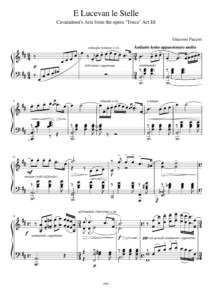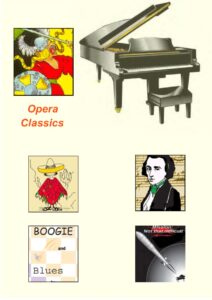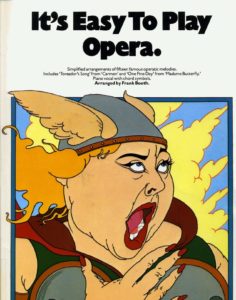Table of Contents
Come join us now, and enjoy playing your beloved music and browse through great scores of every level and styles!
Can’t find the songbook you’re looking for? Please, email us at: sheetmusiclibrarypdf@gmail.com We’d like to help you!
Homage to Giacomo Puccini (1858-1924)

Puccini – E lucevan le stelle (Tosca) Piano & Voice (spartiti, sheet music, Noten, partitura)
Giacomo Puccini (short bio)
Giacomo Puccini (Lucca, 22 December 1858 – Brussels, 29 November 1924) was an Italian composer, considered one of the greatest and most significant opera composers of all time.
Best Sheet Music download from our Library.
His early compositions were rooted in the Italian opera tradition of the late 19th century. However, Puccini subsequently successfully developed his work in a personal direction, including some themes of musical realism, a certain taste for exoticism and studying Richard Wagner’s work both from a harmonic and orchestral point of view and for the use of the leitmotif technique. He received his musical training at the Milan conservatory, under the guidance of masters such as Antonio Bazzini and Amilcare Ponchielli. At the Conservatory he also made friends with Pietro Mascagni.
Puccini’s most famous works, considered repertoire for the major theaters of the world, are La bohème (1896), Tosca (1900), Madama Butterfly (1904) and Turandot (1924). The latter was not completed because the composer passed away, struck down by throat cancer (Puccini was a chain smoker), before being able to finish the last pages. Different endings were then added to the work: that of Franco Alfano (the first, contemporary with the world premiere and still most performed today); subsequently in the 21st century that by Luciano Berio, quite represented. There is no shortage of other proposals and studies for new completions.

Please, subscribe to our Library.
If you are already a subscriber, please, check our NEW SCORES’ page every month for new sheet music. THANK YOU!
Giacomo Antonio Domenico Michele Secondo Maria Puccini was born in Via di Poggio, in the center of Lucques, in 1858, in a raised family. He is the first child of a family of seven children: five older children and one brother, of five younger children, nor three months after the death of their father. Father Michele Puccini is a composer of sacred music, organist and choirmaster at the Cathedral of Saint-Martin de Lucques. Sa mother Albina Magi to Michele in 1848 or 1849.
The poursuit à one or two exceptions to the same musical études that are illustrious aïeux, all musicians of the world. Complete thirty-two works for your act.
After the death of his father in January 1864, even though he was younger than five years old, he was sent after his mother Fortunato Magi to study; celui-ci l’initie au clavier et au chant choral mais le considère come un élève peu doué et indiscipliné. Fortunato succeeded Michele Puccini as maître de chapel and organist. Indeed, the current place is occupied by several generations of the Puccinis, and it is clear that Fortunato will find the place for young Giacomo who is the one who will be ready to take on this role.
Today they enter the choir of the cathedral of Lucques and begin to touch the orgue. The inspiration for lyrical art and secular music came from a performance of Verdi’s Aïda which Carlo Angeloni, one of his conservatory professors, discovered in Pise on 11 March 1876. From 1880 to 1883, the study at the Milan conservatoire7, where the est the élève of Amilcare Ponchielli and Antonio Bazzini.
In 1882, Puccini participated in a writing competition launched by the music publishing house Sonzogno in 1883, for a one-act opera. Although he did not win the prize with Le Villi, his first opera was performed in 1884 at the Teatro Dal Verme in Milan, thanks to Ponchielli and Ferdinando Fontana, and this performance helped to attract the attention of Ricordi, the publisher of Verdi, who commissioned a new opera from him, Edgar. It was at this time that Puccini met Elvira Gemignani (née Bonturi, 1860-1930) who would become his wife and give him a son, Antonio (1886-1946). She is married to someone else, which does not prevent Puccini from trying his luck.
The husband, unsuspicious and often absent, does not distrust the young man who happily agrees to give piano lessons to the wife when she asks him (Puccini, after the success of the Villi, began to make an excellent impression reputation). The two “lovebirds” poorly conceal their affair, so that all of Lucca is aware of the scandal, except the deceived husband. The climate becoming heavy, however, Puccini bought a villa in Torre del Lago, where he lived for most of his life, accompanied by Elvira. Also, the criticism is quite ironic when Edgar, his second opera, is performed (successfully), since the plot has many points in common with this vaudeville adventure.
His third opera, Manon Lescaut, was not only a success, but also the starting point of a fruitful collaboration with the librettists Luigi Illica and Giuseppe Giacosa, who worked with him on the following three operas.

In 1896, he created an opera, La Bohème, adapted from Scènes de la vie de bohème by Henri Murger. Although it contains some of the most popular tunes in her repertoire, its harmonic and dramatic daring, contrasting with the sentimentalism of Manon Lescaut, fails to seduce the audience of the premiere on February 1 (despite the impeccable direction of Arturo Toscanini). The following performances, however, ensured the composer worldwide success.

In 1900, Tosca represented for Puccini the first approach to verismo; the work is marked by patriotic fervor, but it relates a love drama without committing to the ideological terrain like Verdi’s operas. The contrast between La Bohème and Tosca is such that Puccini suffers a stinging setback. Fortunately, when Toscanini took up the work again, it was a success.
The composer’s activity slowed down and, in 1903, he was injured following a car accident which left him lame.
In 1904, Madame Butterfly (based on a play by David Belasco) was met with a scathing fiasco at its premiere at La Scala in Milan, although it was remarkably orchestrated and directed by Cleofonte Campanini and staged by Adolfo Hohenstein. In particular, during the scene where we hear birdsong, the audience laughs and makes all kinds of barnyard cries heard. This does not prevent it from becoming, three months later, another of his great successes, after a drastic revision.
In 1906, one of his librettists, Giacosa, died.
In 1909, a scandal broke out: his servant committed suicide by poisoning after being accused by Elvira Gemignani of having had a relationship with him. It seems that it was the sister of the servant who had a relationship with Giacomo Puccini. The servant served as mediator, she committed suicide so as not to betray the secret. Similar to Act III of Turandot where Liù commits suicide so as not to reveal the secret.
In 1910, he composed La fanciulla del West, the first opera created at the Metropolitan Opera in New York. The work, considered the first spaghetti western, was directed by Toscanini; it presents an orchestral and harmonic richness unrivaled in Puccini’s work. The immediate success with the public (and also the critics) was not confirmed: the theme of the Wild West, the audacity of its writing and, strangely, its “happy ending”, confused the public and the critics. It takes all the will of artists like Dimitri Mitropoulos, Plácido Domingo, and musicologists eager to go beyond clichés, to bring this remarkable work out of oblivion.
Il trittico was created in 1918. This triptych is made up of three operas brought together in the Parisian Grand-Guignol style: a horror episode Il Tabarro, a sentimental tragedy Suor Angelica and a farce or comedy Gianni Schicchi. Of the three, Gianni Schicchi became the most popular thanks to the aria ‘O mio babbino caro’.

His last opera Turandot, written in 1924, remains unfinished; the last two scenes will be completed by Franco Alfano. This finale is very contested today because Puccini had dreamed for the final duet of something new and fantastic, comparable to a great Wagnerian scene (we measure, when we hear Nessun dorma or the last aria of Liù Tanto amore, segreto , the extent of the loss caused by the composer’s illness). Alfano, a good composer however, does not have the genius of his master. If, most of the time, today we only conduct a shortened version of Alfano’s finale, the complete version was recently brought up to date by Antonio Pappano, with a concert and the production of a published complete version. in 2023 at Warner Classics.
In 2001, a new finale was written by Luciano Berio.
Puccini died in Brussels on November 29, 1924, of cardiac complications due to throat cancer. After a funeral at the royal church of Sainte-Marie in Schaerbeek, his body was transported to Milan where, on December 3, 1924, his funeral was celebrated in the cathedral by Archbishop Eugenio Tosi. At the end of these, his remains were temporarily buried in the monumental cemetery of Milan, in the family vault of Arturo Toscanini. On November 29, 1926, on the second anniversary of his death, Giacomo Puccini was reburied in the chapel of his villa in Torre del Lago16.
His villa is today a museum dedicated to his memory.
Manon Lescaut, La Bohème, Tosca, Madame Butterfly and Turandot are all big hits. They illustrate an exceptional mastery of orchestration, with multiple harmonic innovations, and a profoundly original theatrical language. This language which contributed to Puccini’s success was linked to the literary movement of Italian verismo, represented by composers from the end of the 19th century, such as Mascagni, Leoncavallo or Franchetti. Puccini, however, escapes the tragic realism of verismo, thanks to his passion for the romantics like Alfred de Musset or Heinrich Heine, but also because of his theatrical and musical modernity, illustrated by the chromaticisms of Tosca or the impressionist chords of Houppelande (Il Tabarro) influenced by the daring of Debussy and Ravel, and the deep mark left in his work by Wagner.
Puccini’s Works
Puccini – Nessun Dorma (from the Opera Turandot) Piano Solo arr. (spartito, sheet music)
Puccini O Mio Babbino Caro O, my Beloved Father – Easy Piano Solo arr (sheet music)
Browse in the Library:
Or browse in the categories menus & download the Library Catalog PDF:
